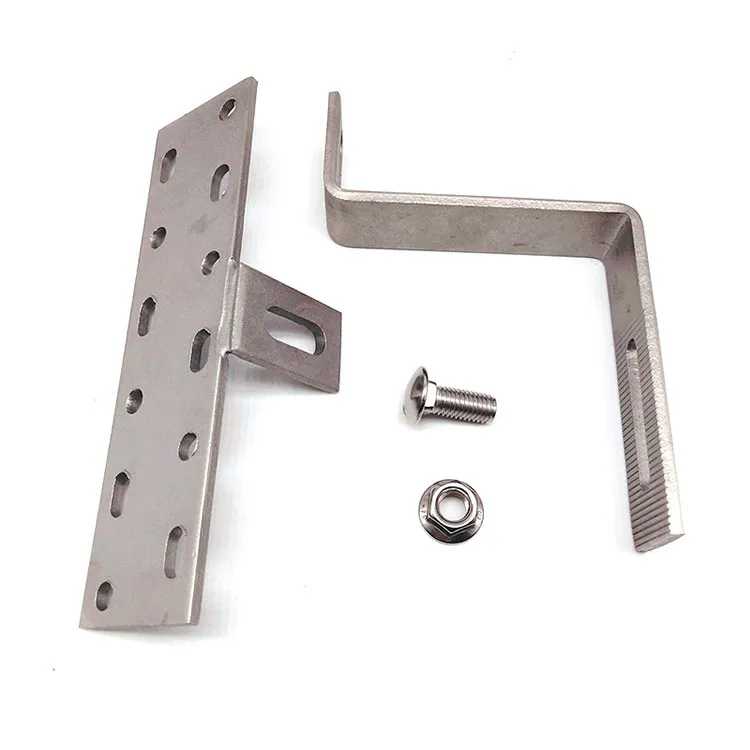Why Should You Consider Using Roof Hooks for Your Solar Panel Installation?
2024-11-15
When it comes to installing solar panels, the right mounting system is crucial to ensure safety, durability, and maximum energy efficiency. One key component that often goes unnoticed but plays a vital role in the installation process is the roof hook. But why should you consider using roof hooks for your solar panel installation? In this blog, we’ll dive into the importance of roof hooks, how they work, and why they are an essential part of a reliable and long-lasting solar power system.
What Are Roof Hooks?
Roof hooks are specialized mounting devices used to anchor solar panel racking systems to a roof. These hooks are typically made of durable materials like stainless steel or aluminum and are designed to attach to the roof's trusses or beams. Once secured, they serve as the base for the rails that hold the solar panels in place.
Roof hooks come in various shapes and sizes, designed to fit different types of roofs, including asphalt shingle, metal, and tile roofs. They are a critical part of the mounting system, as they ensure the solar panels are firmly anchored to the structure of the roof and can withstand various weather conditions.
Why Should You Consider Using Roof Hooks for Solar Panel Installation?
1. Enhanced Stability and Durability
One of the primary reasons for using roof hooks in solar panel installations is their ability to provide exceptional stability. Solar panels are subjected to various weather conditions, from heavy winds to snow, and a solid mounting system is essential to prevent damage or displacement.
Roof hooks are designed to secure the solar panels to the roof’s underlying structure, ensuring that the panels stay in place no matter the weather. By anchoring the racking system to the roof trusses or beams, roof hooks help distribute the weight of the panels evenly, reducing stress on the roof and improving the overall durability of the solar installation.
2. Versatility for Different Roof Types
Roof hooks are highly versatile and can be used with a wide variety of roof types, including flat, sloped, metal, and tile roofs. Depending on your roof’s structure and materials, there are specific roof hooks designed to fit perfectly.
For example:
- Asphalt Shingle Roofs: For this common type of roofing, specialized hooks are used to penetrate the shingles without causing damage or compromising the waterproofing.
- Metal Roofs: Roof hooks for metal roofs often use a clamp or clamp-and-seal design, which ensures a secure attachment without needing to penetrate the metal surface.
- Tile Roofs: For tile roofs, adjustable roof hooks are used to ensure the solar system is securely fastened without disrupting the integrity of the tiles.
This versatility makes roof hooks an ideal solution for homeowners with different types of roofs, ensuring that solar panels can be mounted securely no matter what the roofing material is.
3. Simple and Efficient Installation
Roof hooks simplify the solar panel installation process. Since they provide a secure anchor point for the racking system, installers can mount the solar panels quickly and efficiently. Roof hooks are designed for easy attachment to the roof structure, typically requiring minimal tools and effort.
Many modern roof hooks are adjustable and can be customized to the specific pitch and angle of the roof, making them highly adaptable to a variety of roof slopes. This flexibility speeds up the installation process and reduces the need for complex adjustments.
4. Prevents Roof Damage
When installing solar panels, one of the major concerns is avoiding damage to the roof. Traditional mounting methods can involve drilling or making holes in the roof, which can lead to leaks or compromise the structural integrity of the roof.
Roof hooks are designed to minimize the impact on the roof. For example, they often require fewer penetrations into the roof material, or in some cases, they can be installed without any penetration at all. This reduces the risk of water leakage, which is a common concern when adding any additional fixtures to a roof.
In addition, many roof hooks come with rubber seals or gaskets that ensure water-tight installations, further protecting the roof from potential leaks.
5. Aesthetically Pleasing
For many homeowners, aesthetics matter when it comes to solar panel installation. Roof hooks play a role in ensuring that the solar panels are mounted securely and neatly. These mounting systems are designed to be discreet and low-profile, blending well with the roofline and minimizing the visual impact of the solar installation.
Roof hooks are typically hidden beneath the solar panels themselves, so they don’t interfere with the overall appearance of the home. This is an important consideration for homeowners who want to maximize energy efficiency without sacrificing curb appeal.
6. Long-Term Reliability and Maintenance-Free
Roof hooks are designed to last for the lifetime of the solar panels they support. Made from rust-resistant materials like stainless steel or anodized aluminum, they are built to withstand harsh weather conditions, including rain, snow, and extreme temperatures.
Once installed, roof hooks require minimal maintenance. The robust materials and secure attachment ensure that the mounting system remains stable and safe for years to come. This long-term reliability is a key benefit for homeowners who want a hassle-free, maintenance-free solar installation.
7. Cost-Effectiveness
While roof hooks are just one component of the overall solar panel installation, they are a cost-effective solution when compared to other mounting systems. Roof hooks are relatively inexpensive, but they play an essential role in ensuring that the entire solar power system is secure and functional. By investing in high-quality roof hooks, homeowners can avoid costly repairs or replacements down the line due to improperly mounted solar panels.
Things to Consider When Choosing Roof Hooks
Before installing roof hooks for your solar panel system, there are several factors to keep in mind:
1. Roof Type and Material: Ensure that the roof hooks you choose are compatible with your roof’s material and structure. Consult with a professional installer to determine the best hook design for your roof type.
2. Weight and Size of the Solar System: Make sure the roof hooks are designed to handle the weight and size of your specific solar system. Larger systems may require more robust hooks or additional support structures.
3. Roof Condition: If your roof is old or damaged, it’s important to address any issues before installing solar panels. Roof hooks rely on a strong and stable structure, so it’s essential to ensure your roof is in good condition to support the installation.
4. Professional Installation: While roof hooks are relatively easy to install, it’s always best to have a professional installer assess your roof and mount the panels properly. Professional installation ensures that the system is secure and compliant with local building codes and regulations.
Conclusion
Why should you consider using roof hooks for your solar panel installation? Because they provide stability, versatility, and durability, ensuring that your solar panels are securely mounted to your roof while minimizing potential roof damage. Roof hooks also simplify the installation process, reduce the risk of leaks, and provide a long-term, cost-effective solution for solar energy generation.
Whether you're installing solar panels on a traditional home or an apartment building, roof hooks are an essential component of a reliable solar power system. They help make solar energy accessible and safe, allowing you to enjoy the benefits of renewable energy with peace of mind.



